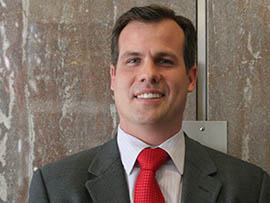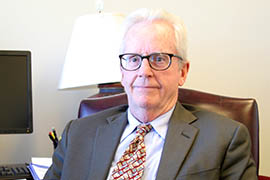Cronkite News has moved to a new home at cronkitenews.azpbs.org. Use this site to search archives from 2011 to May 2015. You can search the new site for current stories.
Republican bills aim to ax Clean Elections, divert funding to education
Deriding the Citizens Clean Elections Commission as ineffective, two Republican state lawmakers have put forward bills that would have voters decide whether to scrap public financing for campaigns and divert the money to education.
“If people knew and understood that Clean Elections was public money for politicians, they wouldn’t be so excited about it,” said Rep. Warren Petersen, R-Gilbert, author of HCR 2004.
Petersen’s bill and SCR 1001, authored by Sen. Steve Pierce, R-Prescott, would strip the commission of its funding and have the Department of Education distribute it to school districts on a per-pupil basis.
Arizona voters created public financing for campaigns in 1998 by approving Citizens Clean Elections Act, through which the Citizens Clean Elections Commission provides money to candidates who refuse to accept private donations and agree to participate in debates. The commission also mails voter guides during election season and enforces campaign finance laws, among other duties.
The commission reported spending about $5.3 million on campaigns during the 2014 election cycle. A Clean Elections candidate for state Legislature in 2014 received $15,253 for the primary and $22,880 for the general election.
In order to qualify for the funds, a candidate must collect a certain amount of signatures and $5 contributions from voters.
Money distributed to candidates comes from a 10 percent surcharge on all civil penalties and criminal fines, civil penalties paid by candidates and the $5 contributions.
Petersen said the commission’s effectiveness was diminished by a 2010 U.S. Supreme Court ruling that struck down matching funds that allowed a Clean Elections candidate to receive extra money if his or her opponent raised more money privately.
“Clean Elections was supposed to change everything, and over time they’ve shown nothing has really changed,” he said. “It’s just that now we have this mechanism of public financing for politicians.”
Thirteen of the 90 current members of the Legislature ran as Clean Elections candidates.
Tom Collins, executive director of the Citizens Clean Elections Commission, said the sponsors are misleading voters by claiming the repeal would benefit schools. The funding boost to education from the Clean Elections Fund would be minimal, he noted.
“Just because (Petersen) thinks it’s ineffective, well then you would think his proposal would go to that issue and it doesn’t,” he said.
Considering the work the commission does in voter education and enforcing anti-corruption laws, Collins said he doesn’t understand why lawmakers would want to get rid of it.
“It seems like an odd way to go about trying to solve election problems, to actually take out the pieces of the puzzle that are actually working,” he said.
House Assistant Minority Leader Bruce Wheeler, D-Tucson, said the House bill doesn’t reflect the desires of Arizona citizens.
“It’s a horrible idea that flies in the face of the public who supported, voted for … the Clean Elections process,” he said.
Garrick Taylor, spokesman for the Arizona Chamber of Commerce, said that public campaign financing is an inherently flawed system.
“Public dollars into junk mail and yard signs is a bad idea,” he said.
While the chamber doesn’t have official positions on the bills, Taylor said it has always been wary of the commission because the chamber doesn’t believe it is the place of government to finance political candidates.
“Our concerns over this financing scheme really have little to do with the candidates that choose this option but rather the fundamental question of whether this is the proper role for government,” he said.
Sam Wercinski, executive director of the Arizona Advocacy Network, said he’s concerned that the legislation is an attempt to undermine the will of voters.
“The government’s supposed to be doing the work of the people, and that is ensuring that the Citizens Clean Elections Act is really strengthened at this point and executed as passed by the voters,” he said.
Groups that are in strong opposition of the commission are the same groups that funnel significant money into elections, Wercinski said.
As dark money groups gain more influence in Arizona, the need for a strong commission will grow, said Robyn Prudhomme-Bauer, president of the League of Women Voters of Arizona.
She said a ballot proposition would put voters in the unfair position of choosing between education and Clean Elections.
“It’s really a shame that they are trying to pit two very important segments of our budget, of our government here in Arizona, against each other,” she said.
Petersen’s bill had yet to be assigned to a committee, while Pierce’s bill had yet to be scheduled for hearing by the Senate Judiciary Committee. Pierce didn’t respond to a request for comment by Thursday afternoon.
Petersen said Clean Elections undermines what he believes to be an important part of any election: going out and getting contributions.
“I mean, if the people closest to you won’t give you a contribution to your campaign, maybe that’s a signal that you shouldn’t be running,” he said.
Got to interview legislators today about #HCR2004 that would pave way to repeal #CleanElections. Attack on Arizona voters or waste of money?
— Agnel Philip (@agnel88_philip) January 22, 2015








